Mazz: Are Red Sox owners preparing for a sale?
This question comes up from time to time and now feels like a good time to ask it again: are the Red Sox owners preparing for a sale? Before we…

LIVERPOOL, ENGLAND – JANUARY 25: Liverpool owners Tom Werner (L) and John Henry speak prior to the Carling Cup Semi Final Second Leg match between Liverpool and Manchester City at Anfield on January 25, 2012 in Liverpool, England. (Photo by Michael Regan/Getty Images)
This question comes up from time to time and now feels like a good time to ask it again: are the Red Sox owners preparing for a sale?
Before we go any further, let me make something clear here: I HAVE NO INSIDE INFORMATION. Every so often, this question gets asked and I usually say the same thing, which is no. That answer has always been the result of information I've gathered over the years from the Tom Yawkey/John Harrington (Yawkey Trust) Era to the current one under John Henry and Tom Werner. And that leads to another obvious question today.
Why the impetus to ask the question again now?
Because I feel like things have changed.
Now let me explain - or at least try to.
Whenever a team or corporation (and the Red Sox are both) starts to trim fat and curb spending, people immediately start to wonder whether a sale is coming. But when the Red Sox were sold the last time from the Yawkey lineage to this one, the opposite happened. During the winter of 2000-01, the Red Sox signed Manny Ramirez to an eight-year, $160 million contract that was then the richest in club history. Further, at the time, the Red Sox actually needed pitching to support right-hander Pedro Martinez - and their first pursuit of the offseason had been right-hander Mike Mussina, who went to the New York Yankees. In some ways, the Ramirez signing came out of nowhere.
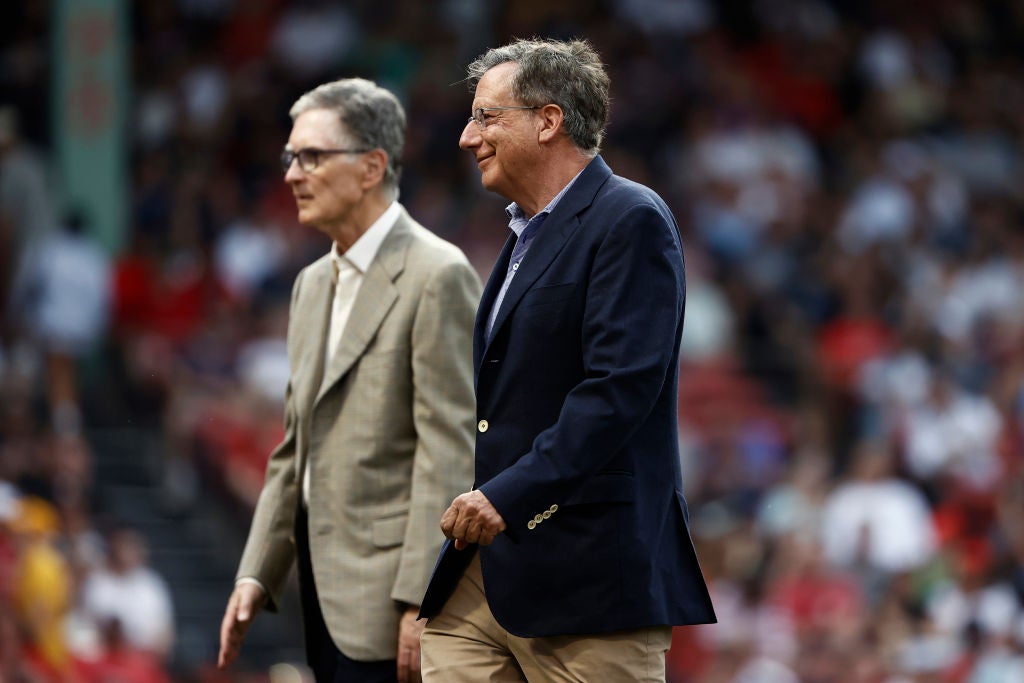
BOSTON, MA - JUNE 26: Chairman of the Boston Red Sox Tom Werner and principle owner John Henry walk on the field before the game between the Boston Red Sox and the New York Yankees at Fenway Park on June 26, 2021 in Boston, Massachusetts. (Photo By Winslow Townson/Getty Images)
Here's the part we all missed at the time: the Red Sox were about to begin a new cable deal (with AT&T, if memory serves?) that was going to reward the club for every paid subscription by any AT&T subscribers. The more subscribers, the more revenue. The Red Sox needed stars and they needed compelling nightly content. Even then, before Henry and Werner, the business of the Red Sox was as much about the television show as the actual baseball team.
One year later, right around Christmastime, the Yawkey Trust reached an agreement to sell. The deal finalized in the spring of 2002 and the Red Sox changed forever.
Now let me say this: when Henry, Werner and Larry Lucchino took over the Red Sox, I feared the worst. All three came from small markets - Henry from the then-Florida Marlins, Werner and Lucchino from the San Diego Padres. I thought they wanted to run the Red Sox like the Oakland A's and they even went so far as to pursue Billy Beane. As it turned out, the Red Sox went in the other direction and became one of the bigger spenders in baseball - the exact opposite of what they were under the Yawkey Trust and what many like me had predicted - winning championships in 2004, 2007, 2013 and, as we all know, 2018.
Now, let me add this: somewhere along the line, during all the winning, I once asked John Henry how long he and his partners intended to own the team: Henry cited a television show Werner had produced, Twenty Good Years, in which two aging friends vowed to enjoy the next stage of their lives. In the comment, Henry suggested that he and Werner had wondered whether they should extend that agreement to 25 years given how well things had been going.
The coming 2024 season will be their 23rd together in Boston.
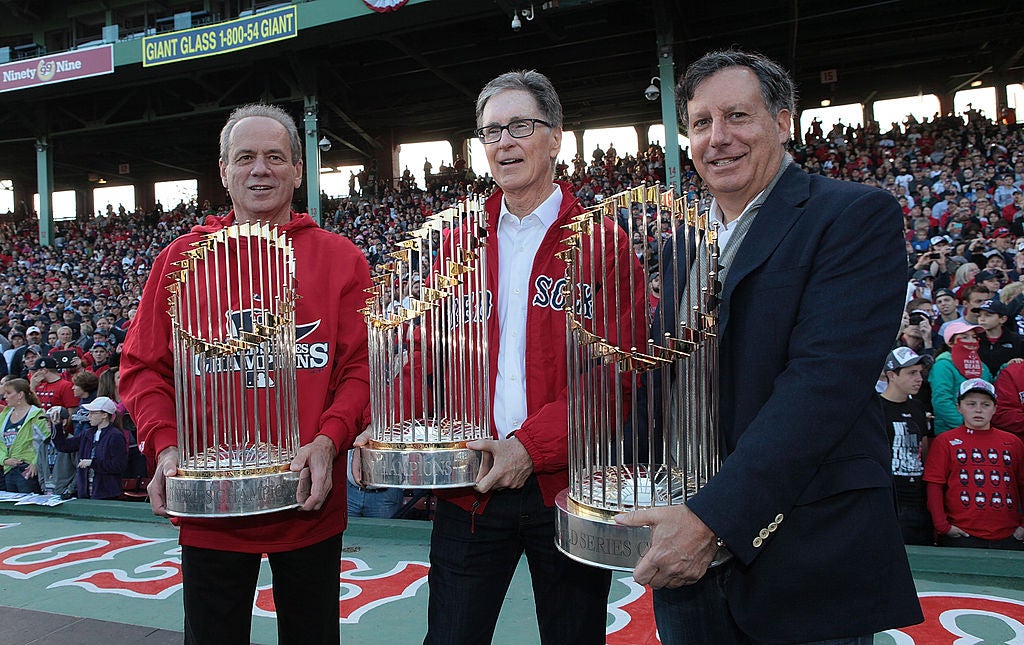
BOSTON, MA - NOVEMBER 2: President and CEO of the Boston Red Sox Larry Lucchino, (left), Red Sox principal own John Henry (center), and Red Sox chairmanTom Werner show off the World Series trophies to the crowd at Fenway Park before the Red Sox players board the duck boats for the World Series victory parade for the Boston Red Sox on November 2, 2013 in Boston, Massachusetts. (Photo by Gail Oskin/Getty Images)
So, again, the logical response: wait, you just said the previous ownership increased spending before announcing the team was up for sale. Haven't these guys done the opposite? Yes, especially with regard to the singular big, burdensome, superstar contract - excluding Rafael Devers. But there are obvious differences between the Red Sox of 2002 and the Red Sox today. There are also obvious differences in baseball.
For starters, the 2002 Red Sox had a great deal of room for growth. The previous owners ran a mom-and-pop operation that did not come close to maximizing the Red Sox' popularity or revenue streams. They lacked the vision or willingness to improve the ballpark. The new owners came in, invested in the team, improved Fenway Park, made NESN even more profitable. In the last 20-plus years - for better, worse or both - the Red Sox grew from a New England apple orchard into a national brand that became a monster at the box office and added seats above the left field wall. The owners that paid $770 million to buy the team and its properties now have an asset valued at more than $4.5 billion.
Oh, the value of the Sox will still go up in coming years.
But there is just no way it can continue to grow as rapidly as it has.
Now, what does that all mean? Good question. As many agree, the Red Sox feel like just a part of the portfolio amassed by the Fenway Sports Group, which also has a vested interest in international soccer, auto racing, the NHL and professional golf, among other entities. Maybe they want an NFL team. Maybe they want an NBA team. And maybe they are willing to effectively trade a baseball asset to get it, especially considering some of the realities that make baseball a tougher business than the others.
For starters: the NHL is a much smaller money-maker than baseball, but it has the firmest salary cap in sports. The NBA and NFL had malleable caps and, now, a far more popular products. Certainly, it's possible that the Fenway Sports Group wants to add an NFL or NBA team to its list of holdings. But we all know that Henry, in particular, despises the revenue-sharing model that often costs the Red Sox tens of millions annually. On a percentage basis, baseball and the Red Sox just cannot be as profitable as they used to be, and that doesn't even begin to address the concerns that now exist with NESN and regional sports networks.
Try Googling it. See what you come up it. Purely based on the numbers, Red Sox television ratings peaked in 2007. Those numbers have now dipped to less than 25 percent of what they were and the Sox have finished last three times in four years.
In the end, here's the point: it might just be time.
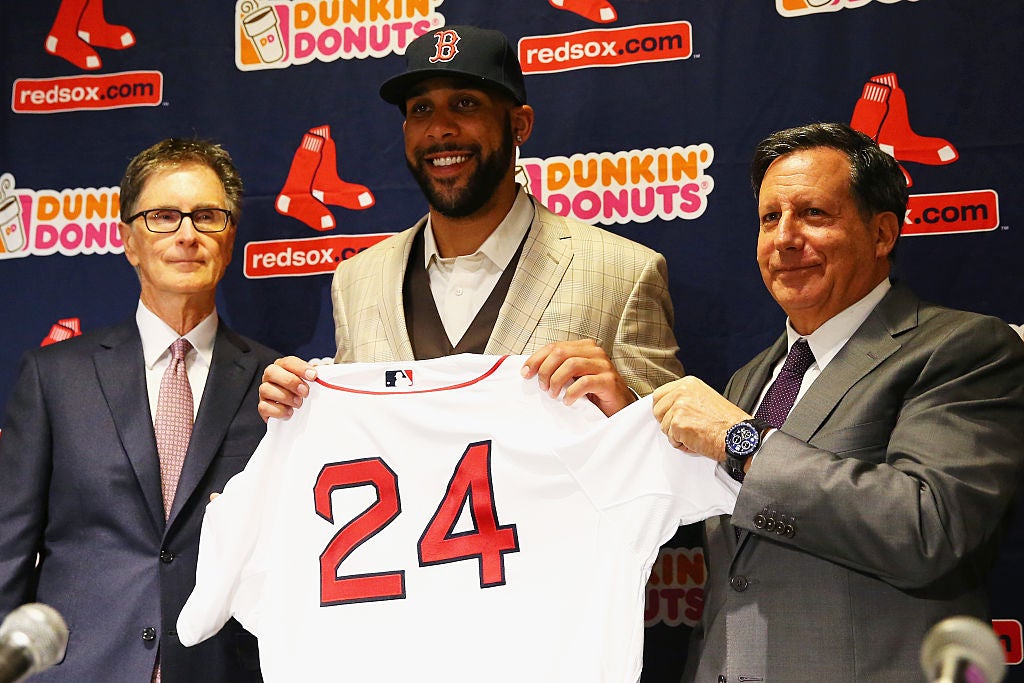
BOSTON, MA - DECEMBER 04: David Price is introduced by Red Sox owner John Henry, left, and Chairman Tom Werner during his introductory press conference at Fenway Park on December 4, 2015 in Boston, Massachusetts. (Photo by Maddie Meyer/Getty Images)
So again, what has changed since 2001-2002? Only everything. The Red Sox don't have nearly as much room for financial growth. The storyline of the curse is kaput. Baseball itself isn't nearly as popular as it was. The regional sports networks are crumbling. For the Red Sox to have the rosiest future possible - from a business perspective, mind you - the team needs talented young players and a continuous stream of controllable assets. For a team that changed philosophies repeatedly over the years has now gone from Chaim Bloom to Craig Breslow, which feels like an attempt for better execution of the same plan.
If you ask me now, I think they're getting ready to sell. Maybe later this year. Maybe next year. Maybe the year after.
That would give them their 25 years, some good and some bad.
Mazz: The 2024 Red Sox offseason plan
For the Red Sox, if it hasn’t already, the 2024 season begins today. Red Sox president Sam Kennedy and manager/general manager/baseball ops alpha Alex Cora will address the media and begin sifting through the rubble of another lost year. Possibly, team officials may give us some insight into the Red Sox' offseason plan.
In the interim, we'll deduce some things on our own.
Over the coming days and weeks, beginning with this overview, we will offer a position-by-position breakdown of where the Red Sox stood in 2023 and where they may be headed in 2024 (and beyond). Starting tomorrow, the plan is to provide a relatively detailed look at every position on the diamond by examining where the Sox stand relative to the other teams in the American League and the entirety of Major League Baseball, all with the hopes of exploring what needs to change – and how quickly.
The good news? If the Sox are willing to spend – and longtime MLB.com correspondent Ian Browne recently sounded confident they will – improvement can come relatively quickly.
One final note: Years ago, during the heyday of owners John Henry and Tom Werner, then-general manager Theo Epstein once suggested that the goal of the Red Sox baseball operation was to have an above average major-leaguer at most every position while being no worse than average at any position. Make sense? With that in mind, we give you an opening look at the State of the Red Sox entering a pivotal offseason in an attempt to decipher the 2024 Red Sox offseason plan.
Catcher
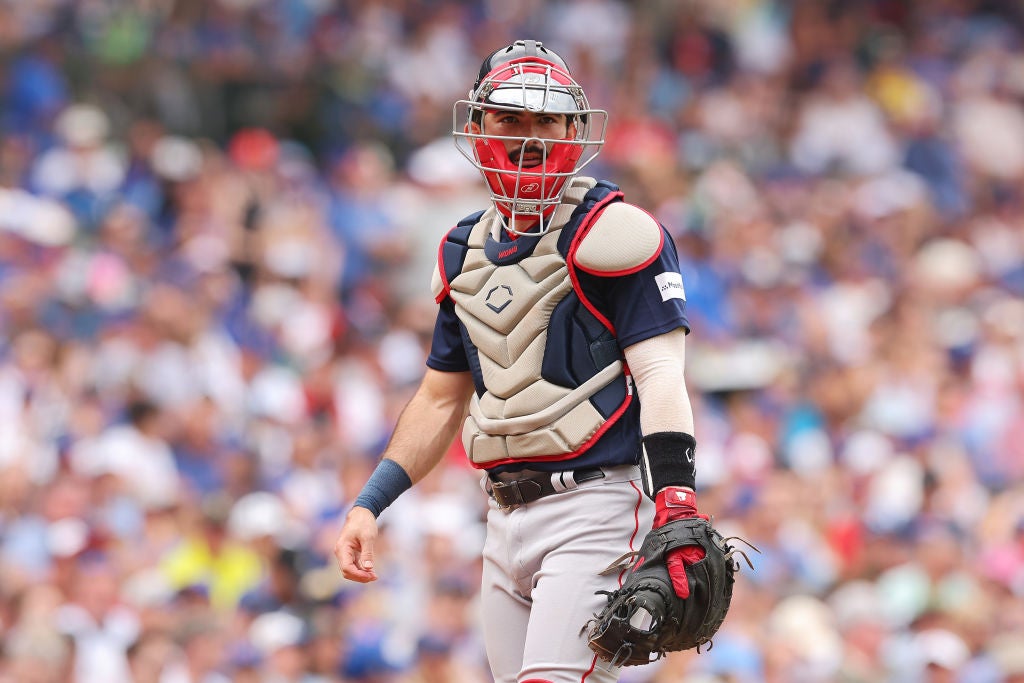
CHICAGO, ILLINOIS - JULY 16: Connor Wong #12 of the Boston Red Sox looks on against the Chicago Cubs at Wrigley Field on July 16, 2023 in Chicago, Illinois. (Photo by Michael Reaves/Getty Images)
Notable team offensive, overall ranks
AL: Ninth in OPS, 10th in WAR
MLB: 18th in OPS, 19th in WAR
Notable team defensive ranks
AL: Fifth in DRS, 10th in DEF
MLB: 12 in DRS, 18th in DEF
OK, the catching on this team isn't a total disaster - but it isn't good, either, no matter how much people want to talk up Connor Wong. In a perfect world, Wong would be a backup to an experienced starter who bats left-handed and can handle a staff. We're not sure that profile is available and the position is almost always imperfect. (The Sox reportedly explored the right-handed-hitting Sean Murphy last offseason but he was dealt to Atlanta.)
The Sox have other needs (read: starting pitching) that are greater and 2023 first-round pick Kyle Teel is already at Double-A. The guess is that the Sox will continue to stopgap here, though it wouldn't hurt to upgrade Reese McGuire. The free-agent market is thin. Overall, the Sox are slightly below average at this position, but other needs are bigger.
First base
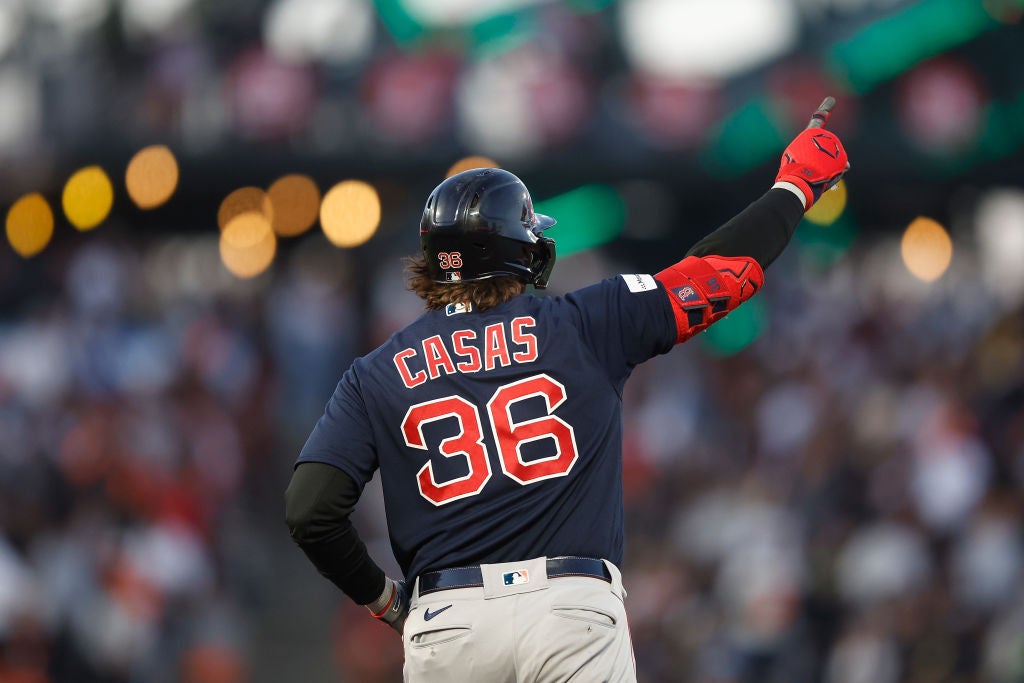
SAN FRANCISCO, CALIFORNIA - JULY 28: Triston Casas #36 of the Boston Red Sox celebrates after hitting a solo home run in the top of the fifth inning against the San Francisco Giants at Oracle Park on July 28, 2023 in San Francisco, California. (Photo by Lachlan Cunningham/Getty Images)
Notable team offensive, overall ranks
AL: Second in OPS, fourth in WAR
MLB: Seventh in OPS, 10th in WAR
Notable team defensive ranks
AL: Sixth in DRS, 15th in DEF
MLB: 17th DRS, 30th in DEF
For all the things that went wrong for the Red Sox this year, here's something that generally went right: the development of Triston Casas. (Once again, a reminder that he was drafted under Dave Dombrowski.) By the end of the season, Casas looked like a bona fide middle-of-the-order bat. In his final 106 games, Casas batted .293 with a .922 OPS. The defense was poor for the first half of the season, though he did improve some as the year progressed.
Will Casas ever be a great first baseman? Probably not. But if he can become an average fielder, the Sox can sandwich him and Rafael Devers around a right-handed bat at the 2-3-4 spots in the lineup (or 3-4-5) to form a heart of the order that could be formidable for years to come. This is one of the few spots on the diamond where the Sox shouldn't need to mess with anything for at least some time.
(This feels like a good time to mention the following: DRS is defensive runs saved and rates a player defensively among those at his position; DEF is defensive runs above average and factors in a positional adjustment so that, in this case, first basemen can be compared to other positions. As a result, most (if not all) first basemen have a negative rating in this area, though the Red Sox ranked dead last.)
Second Base
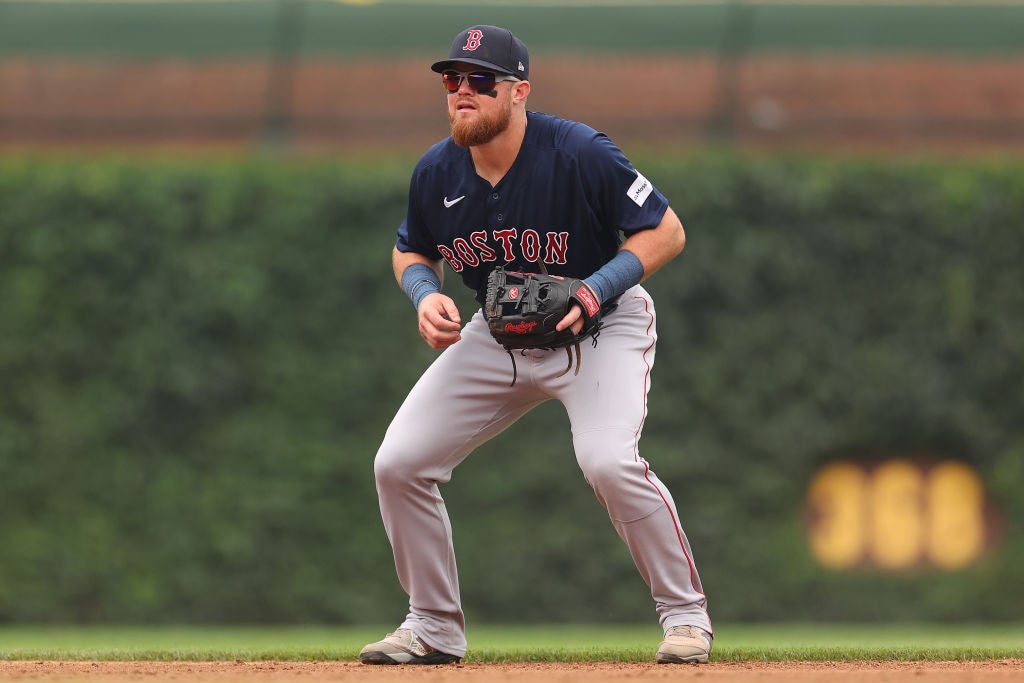
CHICAGO, ILLINOIS - JULY 16: Christian Arroyo #39 of the Boston Red Sox in action against the Chicago Cubs at Wrigley Field on July 16, 2023 in Chicago, Illinois. (Photo by Michael Reaves/Getty Images)
Notable team offensive, overall ranks
AL: Fifth in OPS, 11th in WAR
MLB: 17th in OPS, 26th in WAR
Notable team defensive ranks
AL: 15th in DRS, 15th in DEF
MLB: 30th DRS, 30th in DEF
Quick, name the Red Sox second baseman this year. The right answer? There isn't one.
In order of games played, the Red Sox had 12 players appear at the position in 2023: Christian Arroyo, Enmanuel Valdez, Pablo Reyes, Luis Urias, Enrique Hernandez, Justin Turner, Yu Chang, Connor Wong, Ceddanne Rafaela, David Hamilton, Trevor Story, and Bobby Dalbec. So who's the starter in 2024? Good question.
The Sox actually got half-decent offense at this position, but the defense (as was the case at many positions this year) was a disaster. The best plan may to be move back Trevor Story, who isn't going to like it. But a team like the Red Sox shouldn't be taking such a sloppy approach.
Third base

ARLINGTON, TEXAS - SEPTEMBER 20: Rafael Devers #11 of the Boston Red Sox tries to field a ground ball in the fifth inning against the Texas Rangers at Globe Life Field on September 20, 2023 in Arlington, Texas. (Photo by Tim Heitman/Getty Images)
Notable team offensive, overall ranks
AL: First in OPS, eighth in WAR
MLB: First in OPS, 13th in WAR
Notable team defensive ranks
AL: 12th in DRS, 14th in DEF
MLB: 26th DRS, 29th in DEF
Starting in 2024, Devers will count for a little more than $29 million per year on the Red Sox luxury tax payroll, which is fine. He's an elite offensive run producer. This year, despite some ups and downs, he finished first in OPS among all regular third baseman, which is no small feat.
So why is his WAR (a combination of offense and defense) relatively low? Because his defense in 2023 was poor. And let's make this much clear: the value of Devers' 10-year, $313.5-million contract depends on him providing elite production as a third baseman. If he becomes a below average fielder and/or designated hitter, his value goes down.
While he may never be a great third baseman, Devers needs to be much better in the field than he was in 2023. Still, relatively speaking, he's not a problem.
Shortstop
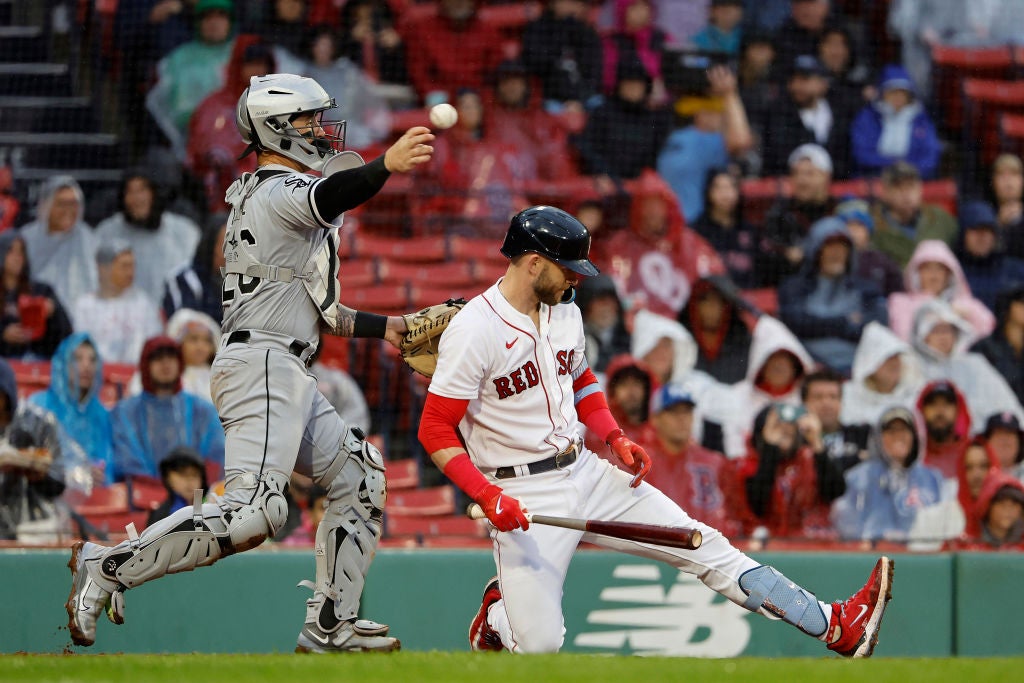
BOSTON, MA - SEPTEMBER 23: Korey Lee #26 of the Chicago White Sox throws down to third base after Trevor Story #10 of the Boston Red Sox struck out during the fourth inning at Fenway Park on September 23, 2023 in Boston, Massachusetts. (Photo By Winslow Townson/Getty Images)
Notable team offensive, overall ranks
AL: 13th in OPS, 14th in WAR
MLB: 27th in OPS, 28th in WAR
Notable team defensive ranks
AL: Sixth in DRS, 13th in DEF
MLB: 12th DRS, 25th in DEF
So here's the argument for keeping Story at shortstop: the Red Sox defense improved considerably once he returned to the lineup. Still, Boston's overall rankings at the position plummeted in the absence of Xander Bogaerts, backboned the San Diego Padres of a WAR that ranked seventh in the majors at the position.
So why consider moving Story to second? Because opening up the market at two positions might prove to make more sense. If there is value in Story's versatility, use it. When he played this year, injury or no injury, he was a major disappointment offensively.
In two seasons with the Sox now, he has batted .227 with a .685 OPS. We're not in Colorado anymore, Toto.
Left Field
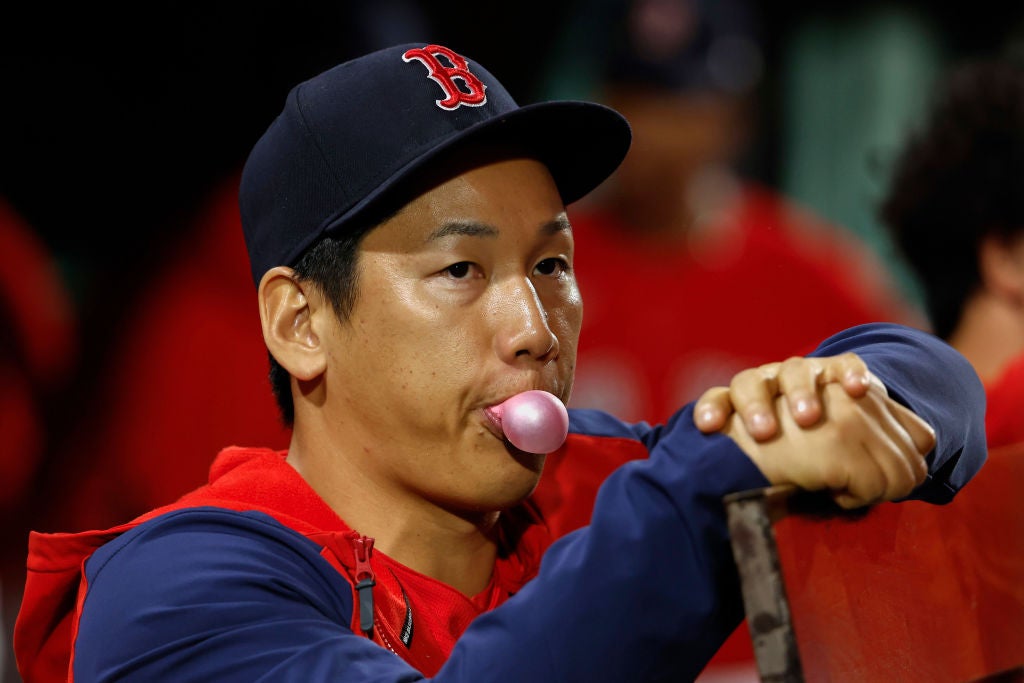
BOSTON, MA - SEPTEMBER 27: Masataka Yoshida #7 of the Boston Red Sox blows bubbles in the dugout during the sixth inning of their final home game of the season against the Tampa Bay Ray at Fenway Park on September 27, 2023 in Boston, Massachusetts. (Photo By Winslow Townson/Getty Images)
Notable team offensive, overall ranks
AL: third in OPS, third in WAR
MLB: eighth in OPS, sixth in WAR
Notable team defensive ranks
AL: 10th in DRS, 13th in DEF
MLB: 12th 15th, 23rd in DEF
Given the above photo, let's put it this way: in the second half, the proverbial bubble under Masataka Yoshida abruptly burst. Yoshida's output plummeted after the All-Star break, his OPS dropping by roughly 200 points while he emerged as a defensive liability.
That said, left field at Fenway Park is one place where you can hide bad defense. (The Red Sox have had a long history of it.) Like everyone, Yoshida has more value if he requires a glove. Still, his presence highlights a core problem in 2023: bad defense at the corners. Only one player can be the designated hitter. The ones who don't have to play representative defense or things could break down.
Center Field
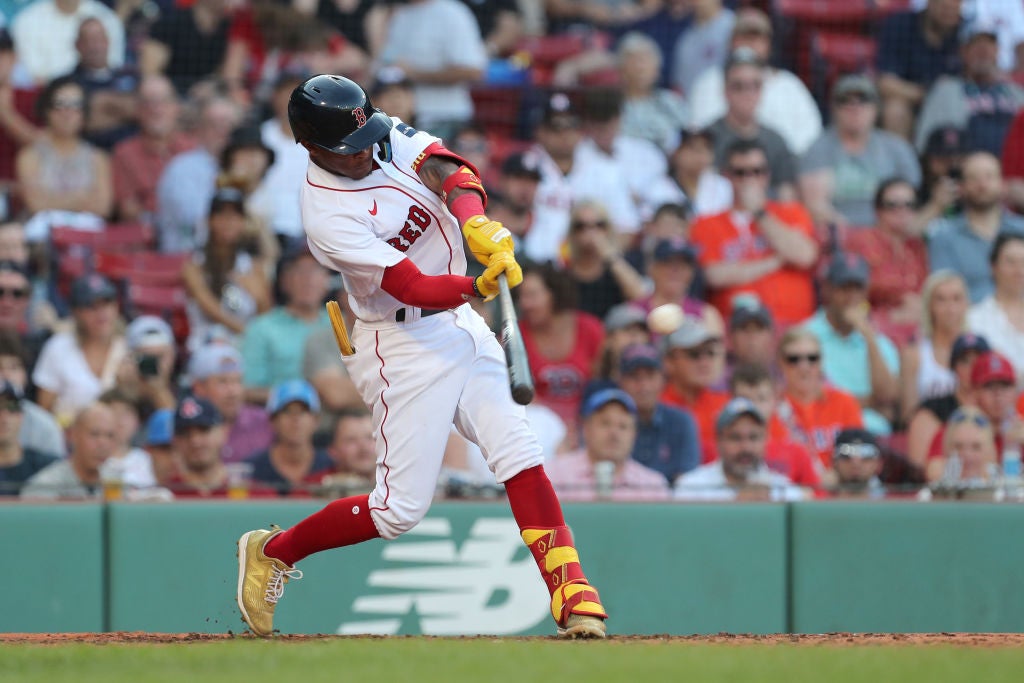
BOSTON, MASSACHUSETTS - AUGUST 30: Ceddanne Rafaela #43 of the Boston Red Sox hits an RBI double during the sixth inning against the Houston Astros at Fenway Park on August 30, 2023 in Boston, Massachusetts. (Photo by Paul Rutherford/Getty Images)
Notable team offensive, overall ranks
AL: second in OPS, third in WAR
MLB: third in OPS, fifth in WAR
Notable team defensive ranks
AL: 13th in DRS, 14th in DEF
MLB: 24th in DRS, 28rd in DEF
The Red Sox employed seven players as their center fielder this season, but the best defensive player of the lot is no longer with the organization: Enrique Hernandez. The other six center fielders included Jarren Duran, Adam Duvall, Ceddanne Rafaela, Wilyer Abreu, Rob Refsnyder, and Raimel Tapia, the first five of whom come with varying questions and the last of whom is no longer with the organization.
There isn't a clear choice here, though a tandem of Rafaela and Abreu is intriguing. The overall defense has to be better. And before you mention Jarren Duran, the best place for him is left field, forcing either him or Yoshida into a DH role. Is one of them trade bait?
Right Field
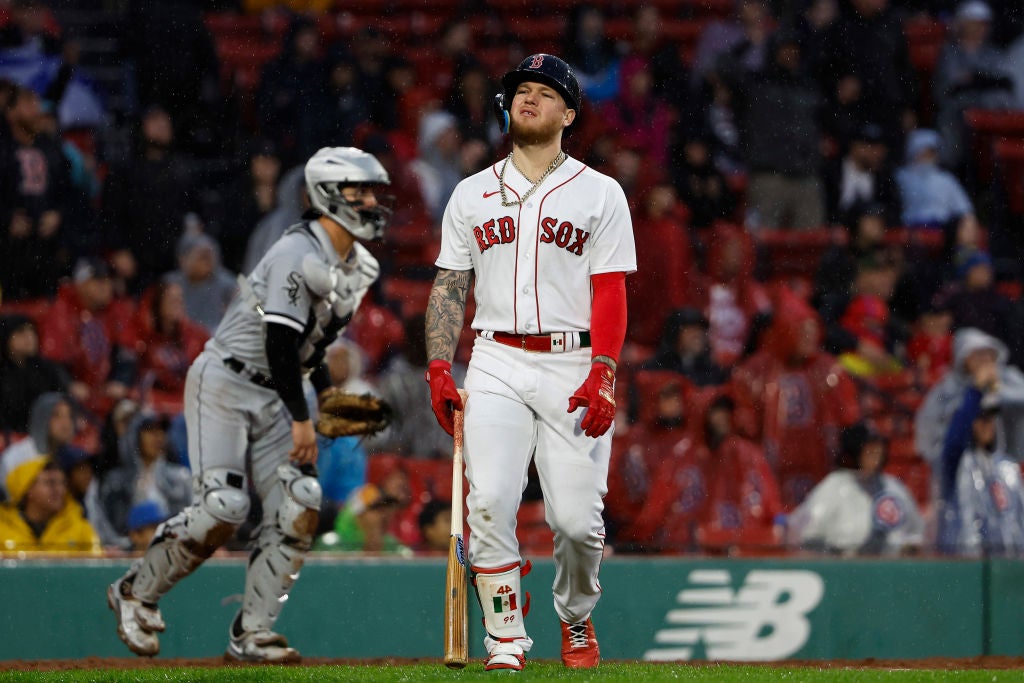
BOSTON, MA - SEPTEMBER 23: Alex Verdugo #99 of the Boston Red Sox reacts after lining out with two runners on-base during the eighth inning of their 1-0 loss to the Chicago White Sox at Fenway Park on September 23, 2023 in Boston, Massachusetts. (Photo By Winslow Townson/Getty Images)
Notable team offensive, overall ranks
AL: fifth in OPS, fifth in WAR
MLB: 10th in OPS, eighth in WAR
Notable team defensive ranks
AL: second in DRS, second in DEF
MLB: fifth in DRS, fifth in DEF
If you're frustrated with Alex Verdugo, you're not alone - the Red Sox are right there with you. The irony is that right field was one of the Red Sox' most competitive positions in 2023, at least based on the numbers. The problem? Verdugo was disciplined at least twice (that we know of) by manager Alex Cora and didn't really make a difference.
From the above participants in center field, the Red Sox may be able to at least fortify two outfield positions and include Verdugo in a trade for pitching. At this point, the most surprising outcome would include his return.
Designated Hitter
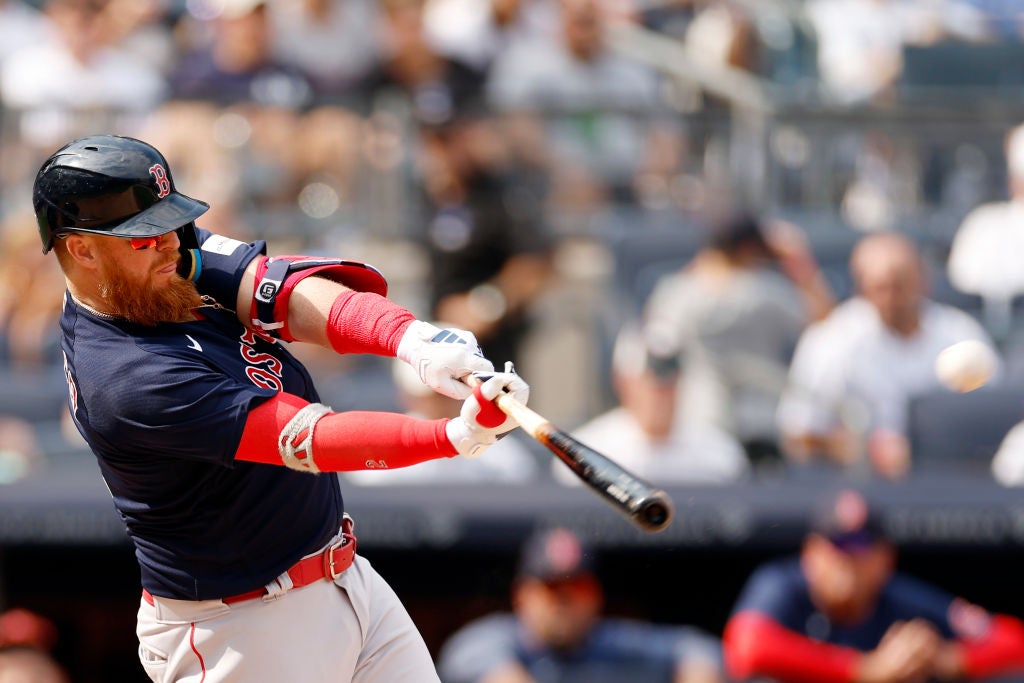
NEW YORK, NEW YORK - AUGUST 20: Justin Turner #2 of the Boston Red Sox hits a three-run home run during the seventh inning against the New York Yankees at Yankee Stadium on August 20, 2023 in the Bronx borough of New York City. (Photo by Sarah Stier/Getty Images)
Notable team, overall ranks
AL: sixth in OPS, ninth in WAR
MLB: 11th in OPS, 13th in WAR
Of all the players acquired by deposed chief baseball officer Chaim Bloom, Justin Turner may ultimately prove to have been the most fruitful. Turner was a good, reliable player for the Red Sox, though the team's ultimate production at the position was slightly above average.
Turner has a player option for 2024 and would be a good fit in the lineup from the right side, but the Sox might actually have more flexibility if he opts out. Could and should they want him back? Depending on the scenarios, sure. But it may depend on whatever else is available to them.
Also, the fact that Alex Cora made sure to give Turner a proper sendoff at Fenway Park suggests that Cora already knows something we do not. Last year, Cora did the same for Xander Bogaerts. Before long, Bogaerts was officially gone.
Bullpen
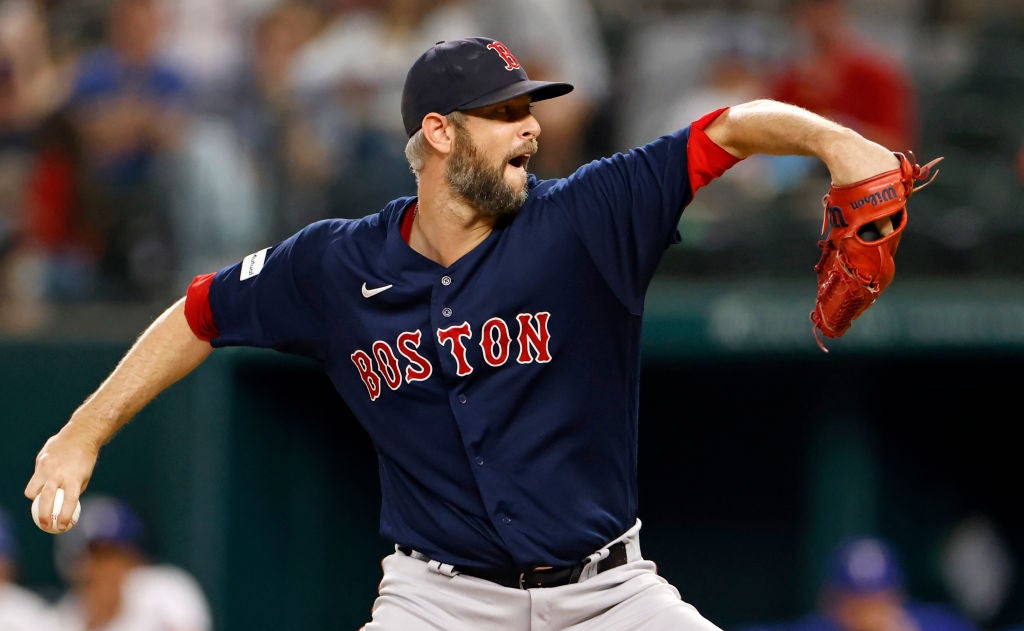
ARLINGTON, TX - SEPTEMBER 18: Chris Martin #55 of the Boston Red Sox pitches against the Texas Rangers during the ninth inning at Globe Life Field on September 18, 2023 in Arlington, Texas. (Photo by Ron Jenkins/Getty Images)
Key rankings
AL: 10th in ERA, 14th in strikeouts per nine, fourth in innings, fifth in WAR, 11th in WHIP, 14th in batting average against, sixth in home runs per nine IP, seventh in walks per nine IP
MLB: 21st in ERA, 25th in strikeouts per nine IP, fifth in IP, 13th in WAR, 23rd in WHIP, 27th in batting average against, 15th in home runs per nine IP, 10th in walks per nine IP
The Red Sox set out with a clear goal for their bullpen in 2023 - to throw more strikes. And they did. Overall, the relief corps was one of the strengths of the team, though the innings piled up and ultimately resulted in the numbers looking worse than they probably deserved to be.
Was the bullpen great? No. But it wasn't as bad as some of those rankings suggest, though the increase in strikes thrown had an obvious side effect: more hits allowed. Still, the Sox didn't give up an absurd number of home runs and the bullpen generally contributed more wins than losses.
Presumably, Garrett Whitlock will be a full-time reliever and that will help, but the Sox could use a stud lefty - like most teams - as insurance for the surprising Brennan Bernardino. All things considered, however, there is lots to work with here.
Starting Rotation
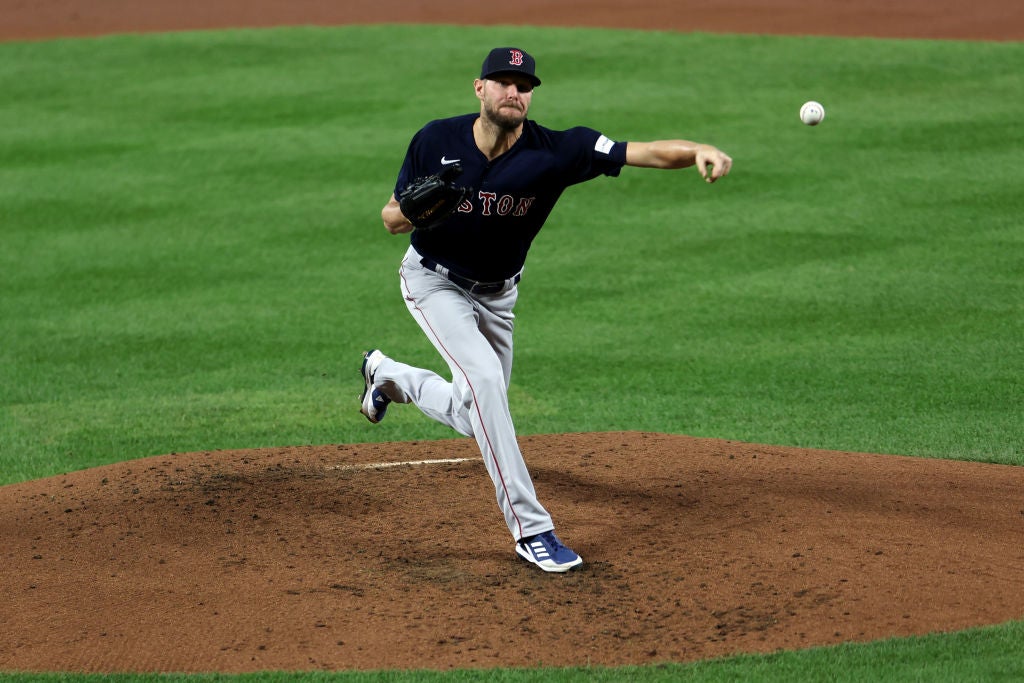
BALTIMORE, MARYLAND - SEPTEMBER 28: Chris Sale #41 of the Boston Red Sox pitches to a Baltimore Orioles batter in the third inning at Oriole Park at Camden Yards on September 28, 2023 in Baltimore, Maryland. (Photo by Rob Carr/Getty Images)
Key rankings
AL: 12th in ERA, fourth in strikeouts per nine, 14th in innings, 12th in WAR, 10th in WHIP, 13th in batting average against,14th in home runs per nine IP, sixth in walks per nine IP
MLB: 22nd in ERA, seventh in strikeouts per nine IP, 27th in IP, 23rd in WAR, 17th in WHIP, 19th in batting average against, 26th in home runs per nine IP, 11th in walks per nine IP
The Red Sox tried to go young this year with Whitlock, Tanner Houck, and Kutter Crawford ... and it wasn't close to good enough. So now what? They couldn't possibly rely on Chris Sale again. (Or could they?) Nick Pivetta closed the season like Secretariat in spikes, but that feels like fool's gold.
What the Sox need is to spend for a frontline starter (Yoshinobu Yamamoto? Blake Snell?) or trade for one (Dylan Cease?) ... or both. The need is pretty clear. Please, no more dinking around. With some help at the top of the rotation, the Red Sox could be considerably better in 2024.
We've seen this before. Time to pay the fiddler.







